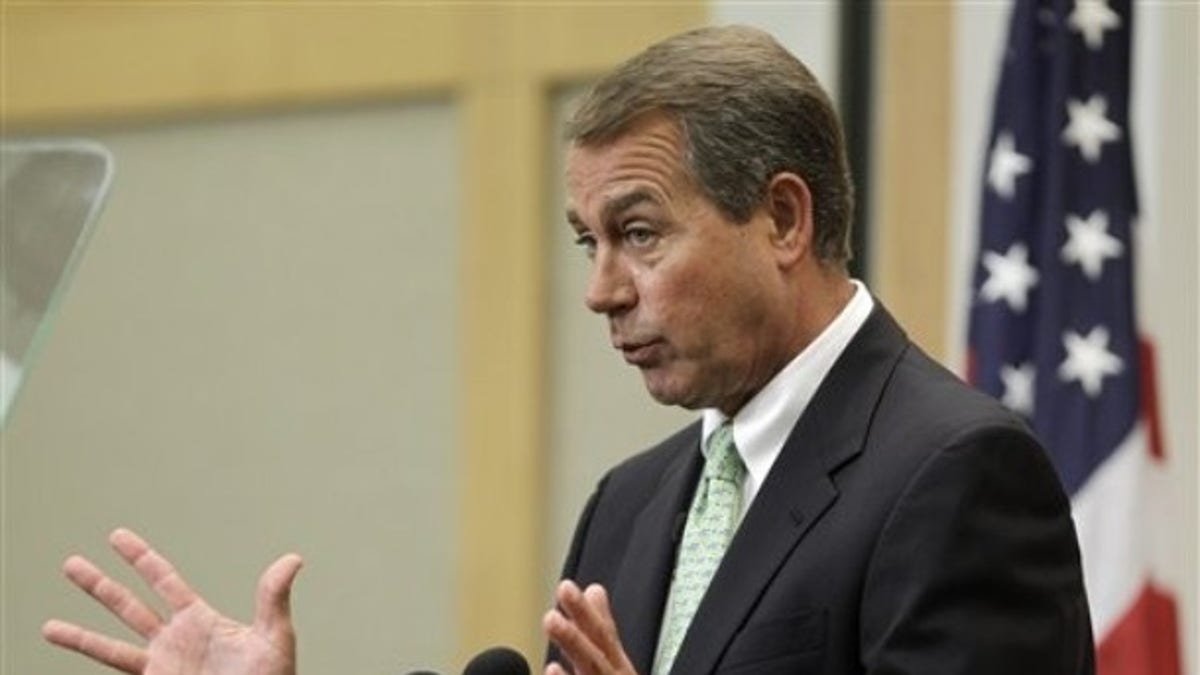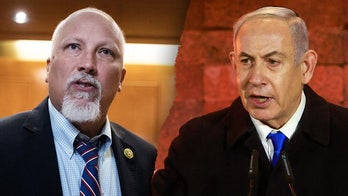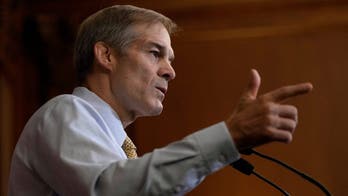
Tuesday: House Minority Leader John Boehner speaks on jobs and the economy at the City Club of Cleveland. (AP Photo)
President Obama should ask for and accept the resignations of Treasury Secretary Tim Geithner, National Economics Council chief Larry Summers and the rest of his economics team, House Minority Leader John Boehner said Tuesday.
In a speech to businessmen in Cleveland, Boehner, the man poised to replace Nancy Pelosi as House speaker if Republicans win back the House majority in November, offered a scathing assessment of the president's stewardship of the U.S. economy, which he said includes massive increases in spending combined with higher taxes and more rules and regulations.
House Republican Conference Chairman Rep. Mike Pence, R-Ind., later joined Boehner in calling for the resignations.
Already budget director Peter Orszag and chief economist Christina Romer have announced their return to their private lives. Boehner, R-Ohio, said Obama should clear the decks of the rest of his advisers.
"We've tried 19 months of government-as-community organizer. It hasn't worked. Our fresh start needs to begin now," he said.
"We have been told that the president's economic team is 'exhausted' ... The worse things get, the more they circle the wagons and defend the indefensible," he said.
Boehner claimed that the failure to see a revival of the economy is due to a "lack of real-world, hands-on experience" among the staff.
Vice President Biden, who was touting the success of stimulus programs, responded to Boehner's comments by saying the minority leader's "so-called plan" doesn't offer an economic agenda, but merely says what the president shouldn't do.
"After months of promising a look at his party's agenda for their plans for America, their economic agenda, he made what was billed this morning as a major economic address. And his chief proposal, when you look at it, apparently was that the president should fire his economic team. Very constructive advice and we thank the leader for that," Biden said.
Obama spokesman Bill Burton said it was ironic that the minority leader wants to get rid of the officials who drug the country out of the recession that began during the Bush administration.
"The irony here is that Boehner would fire the very people who made the tough decisions, who helped to do the tough work, who helped get our economy moving in the right direction," he said.
Boehner spared no criticism in policies the administration has implemented, calling on the president to dispense with "job-killing tax hikes on families and small businesses;" submit to Congress a spending reduction package; refuse to sign any bills passed in a lame-duck Congress; and support Republican efforts to rescind the "1099 mandate" included in the new health care law.
"One of the new law's most controversial mandates requires small businesses to report any total purchases that run more than $600," Boehner said. "If a landscaper wants to buy a new lawnmower, or a restaurant needs a new ice-maker, they have to report that to the feds. If you’re a mom-and-pop grocery store, and you buy $1,000 worth of merchandise from 15 different vendors, that's 15 different forms you have to file.
"What is the point of making employers and entrepreneurs spend $17 billion to send all this paperwork to Washington, where it's going to cost about $10 billion to log it in and file it away? Talk about overhead," Boehner said.
Boehner, whose party has been trying to shake impressions that it merely wants to return to the policies of the Bush administration, offered familiar-sounding remedies. He said the only way to solve fiscal challenges is to cut spending and provide real growth by not raising taxes on small businesses.
In a show of how he'd do things differently, Boehner said if he were House speaker he would try to end the partisanship that has gripped both parties and deadlocked Washington.
"Washington is gripped by a more entrenched uncertainty -- a standstill bred from all the scar tissue built up between the two parties, all the kicking the can down the road, and all the interests that prod us to keep doing so," he said.
Yet, the minority leader offered several suggestions that sounded familiar, even if not executed, including reducing government collections, spending less and stopping deficit spending
Among his suggestions, Boehner offered simplifying the tax code to get rid of temporary breaks that assume a return to higher taxes later; canceling unspent "stimulus" and TARP bailout funds; establishing budget caps on annual federal spending; reducing spending from current levels; freezing government pay and government hiring; and ending new federal regulations.
"We need to take a long and hard look at the undergrowth of deductions, credits, and special carveouts that our tax code has become," he said.
"As we speak, the Obama administration has in the queue 191 rules and regulations that could each have an estimated annual cost to our economy of $100 million or more," Boehner said, noting that Republicans would require congressional approval for any new executive branch rules that cost $100 million or more."
He added that Republican-style "stimulus" would allow small businesses with fewer than 500 employees to take a tax deduction equal to 20 percent of their income.
But Burton said Boehner's proposals would merely benefit 3 percent of business owners at a cost of $700 billion. He also noted that in the previous administration, 4 million jobs were lost while the current administration has seen growth in jobs.
Boehner didn't argue.
"Since February 2009, the private sector has lost millions of jobs while the federal government has grown by hundreds of thousands of workers," he said. "It's just nonsense to think that taxpayers are subsidizing the fattened salaries and pensions of federal bureaucrats who are out there right now making it harder to create private sector jobs."




